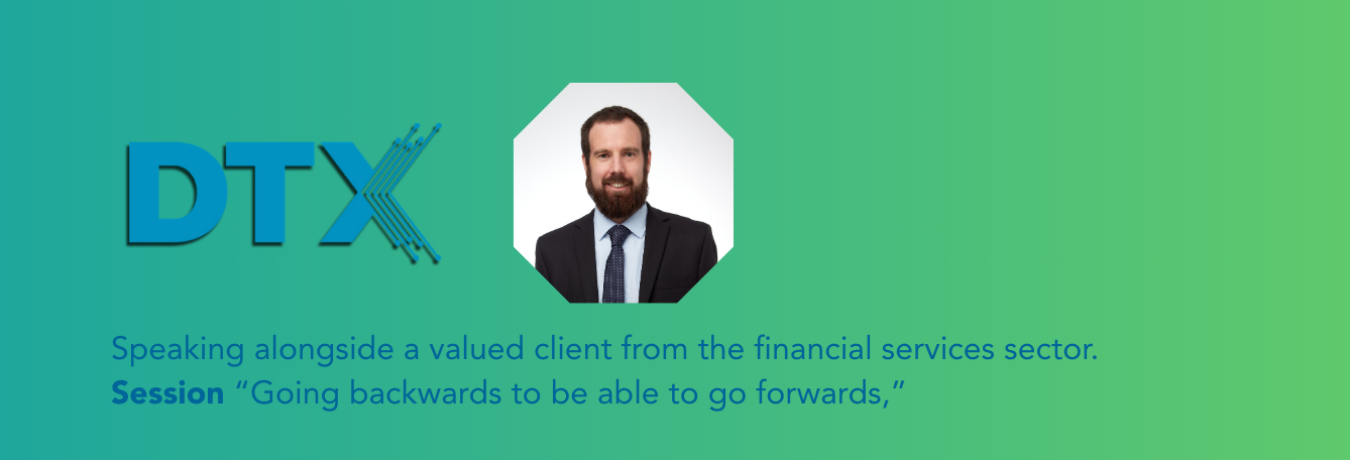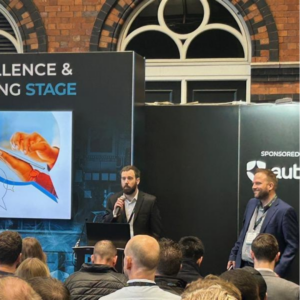Wes Walford's event takeaways from DTX Manchester 2025 - building for the future by going backwards first
Share:
Date:
April 2025

DTX Manchester 2025, part of Manchester Tech Week, unites tech leaders to address real-world challenges through expert talks, live demos, and networking opportunities.
Earlier this month, I had the privilege of speaking at DTX Manchester 2025, one of the UK’s leading events for digital transformation, where I delivered a joint session alongside a valued client from the financial services sector. Together, we delivered a session titled “Going backwards to be able to go forwards,” exploring what it really takes to build a resilient, future-ready technology capability in today’s fast-moving environment.
Taking a step back to move forward
The core of our talk focused on a reality many tech teams face but rarely discuss: sometimes, real progress starts with stepping back. Our client was bold enough to assess their existing platform and capability gaps with honesty and clarity acknowledging what wasn’t working and where improvements were needed. Our session looked at:
- Addressing capability gaps and rethinking underperforming or poorly architected platforms
- Investing in people and collaboration, not just technology
- Building a self-sufficient D365 engineering team that can respond to change, deliver value, and operate with confidence
These aren’t just tech challenges they’re cultural and organisational ones too. And they require a strong partnership between business and IT, underpinned by trust, transparency, and shared goals.
Key takeaways from our client’s transformation journey
 Reflecting on our collaboration with our client, three critical lessons emerged that reinforce the concept of “going backwards to be able to go forwards.” First, the value of iterative delivery was evident; focusing on incremental changes rather than overwhelming transformations ensured consistent business value while maintaining team engagement and balancing ambition with feasibility. Second, open communication proved essential in building trust across the organisation, where transparency about challenges and limitations tempered enthusiasm with realism, fostering stronger stakeholder alignment. Finally, collaboration was pivotal in overcoming platform limitations and resource constraints, enabling smoother processes and improved delivery throughput through cohesive teamwork and shared problem-solving.
Reflecting on our collaboration with our client, three critical lessons emerged that reinforce the concept of “going backwards to be able to go forwards.” First, the value of iterative delivery was evident; focusing on incremental changes rather than overwhelming transformations ensured consistent business value while maintaining team engagement and balancing ambition with feasibility. Second, open communication proved essential in building trust across the organisation, where transparency about challenges and limitations tempered enthusiasm with realism, fostering stronger stakeholder alignment. Finally, collaboration was pivotal in overcoming platform limitations and resource constraints, enabling smoother processes and improved delivery throughput through cohesive teamwork and shared problem-solving.
It was great to highlight how collaboration between client and consultancy can unlock real value: blending outside perspective with internal knowledge to build capabilities that are both technically sound and closely aligned to business outcomes.
The buzz at DTX Manchester
DTX Manchester 2025 delivered a compelling experience, bringing together thought leaders, innovators, and practitioners to discuss the future of digital transformation. The event emphasised the critical role of artificial intelligence (AI), data literacy, and organisational readiness in shaping the success of modern enterprises.
AI for everyone the recurring theme
A recurring theme throughout the conference was the universal need for organisations and individuals to begin their journey with AI. From keynote speeches to panel discussions, experts underscored that engaging with AI even at the most basic level is no longer optional. A constant recommendation how simply experimenting with AI prompts can unlock possibilities and foster understanding of its capabilities. Speakers urged attendees to move beyond passive observation and actively engage with AI tools to uncover their transformative potential and be able to bring this knowledge into their own lives and their organisations.
People as the core of transformation
Another central theme revolved around the human element in digital transformation. Several sessions highlighted a striking imbalance in how organisations allocate resources during change initiatives. While majority of budgets typically go toward technology and project teams, the true drivers of benefit and ROI are people. The employees who must understand, embrace, and adapt to new systems and processes, why do we not spend appropriate budgets on ensuring this step is successful?
A thought-provoking panel titled “Empowering People for Successful Transformation” delved into this issue, emphasising that technology alone cannot deliver value without human buy-in and readiness. Speakers advocated for a shift in priorities: organisations must invest more in training, communication, and change management strategies that focus on people. By ensuring employees understand the ‘“why” behind transformations and equipping them with the skills needed to thrive in new environments, businesses can unlock the full potential of their investments.
Literacy as a strategic imperative
The importance of literacy whether it be data literacy, AI literacy, or digital literacy was another major focus at DTX Manchester 2025. While individual learning is crucial, speakers stressed that organisational literacy must be addressed at all levels to mitigate risks and ensure long-term success.
Attendees were urged to view literacy as a strategic investment rather than a peripheral concern. This includes not only training technical teams but also fostering understanding across all departments from leadership to frontline staff.
There was a clear takeaway: literacy is not just about keeping pace with change—it’s about thriving in it.
Final thoughts
DTX Manchester 2025 was a call to action for organisations to rethink their approach to transformation. By prioritising people, embracing AI experimentation, and fostering organisational literacy, businesses can position themselves for sustainable growth in an increasingly digital world. One thing was clear: transformation is not just about technology it’s about empowering individuals at every level to drive meaningful change no matter the technology (data, AI, digital etc) these are just the tools.
Want to learn more about how we help organisations build future-ready technology capabilities?
Let’s talk – contact us to find out more.
